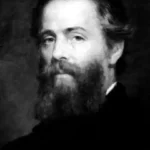 | |
Benito Cereno | |
| Author | Herman Melville |
|---|---|
| Published |
1850
|
| Language | English |
| Nationality | American |
| Genre | Adventure, American Literature |
1850 Short Story
Benito Cereno
Benito Cereno is an English Adventure, American Literature short story by American writer Herman Melville. It was first published in 1850.
Benito Cereno
by Herman Melville
(1855)
In the year 1799, Captain Amasa Delano, of Duxbury, in Massachusetts, commanding a large sealer and general trader, lay at anchor with a valuable cargo, in the harbor of St. Maria–a small, desert, uninhabited island toward the southern extremity of the long coast of Chili. There he had touched for water.
On the second day, not long after dawn, while lying in his berth, his mate came below, informing him that a strange sail was coming into the bay. Ships were then not so plenty in those waters as now. He rose,dressed, and went on deck.
The morning was one peculiar to that coast. Everything was mute and calm; everything gray. The sea, though undulated into long roods of swells, seemed fixed, and was sleeked at the surface like waved lead that has cooled and set in the smelter’s mould. The sky seemed a gray surtout. Flights of troubled gray fowl, kith and kin with flights of troubled gray vapors among which they were mixed, skimmed low and fitfully over the waters, as swallows over meadows before storms.Shadows present, foreshadowing deeper shadows to come.
To Captain Delano’s surprise, the stranger, viewed through the glass,showed no colors; though to do so upon entering a haven, howeveruninhabited in its shores, where but a single other ship might be lying,was the custom among peaceful seamen of all nations. Considering thelawlessness and loneliness of the spot, and the sort of stories, at thatday, associated with those seas, Captain Delano’s surprise might havedeepened into some uneasiness had he not been a person of a singularlyundistrustful good-nature, not liable, except on extraordinary andrepeated incentives, and hardly then, to indulge in personal alarms, anyway involving the imputation of malign evil in man. Whether, in view ofwhat humanity is capable, such a trait implies, along with a benevolentheart, more than ordinary quickness and accuracy of intellectualperception, may be left to the wise to determine.
But whatever misgivings might have obtruded on first seeing thestranger, would almost, in any seaman’s mind, have been dissipated byobserving that, the ship, in navigating into the harbor, was drawing toonear the land; a sunken reef making out off her bow. This seemed toprove her a stranger, indeed, not only to the sealer, but the island;consequently, she could be no wonted freebooter on that ocean. With nosmall interest, Captain Delano continued to watch her–a proceeding notmuch facilitated by the vapors partly mantling the hull, through whichthe far matin light from her cabin streamed equivocally enough; muchlike the sun–by this time hemisphered on the rim of the horizon, and,apparently, in company with the strange ship entering the harbor–which,wimpled by the same low, creeping clouds, showed not unlike a Limaintriguante’s one sinister eye peering across the Plaza from the Indianloop-hole of her dusk saya-y-manta.
It might have been but a deception of the vapors, but, the longer thestranger was watched the more singular appeared her manoeuvres. Erelong it seemed hard to decide whether she meant to come in or no–whatshe wanted, or what she was about. The wind, which had breezed up alittle during the night, was now extremely light and baffling, which themore increased the apparent uncertainty of her movements. Surmising, atlast, that it might be a ship in distress, Captain Delano ordered hiswhale-boat to be dropped, and, much to the wary opposition of his mate,prepared to board her, and, at the least, pilot her in. On the nightprevious, a fishing-party of the seamen had gone a long distance to somedetached rocks out of sight from the sealer, and, an hour or two beforedaybreak, had returned, having met with no small success. Presuming thatthe stranger might have been long off soundings, the good captain putseveral baskets of the fish, for presents, into his boat, and so pulledaway. From her continuing too near the sunken reef, deeming her indanger, calling to his men, he made all haste to apprise those on boardof their situation. But, some time ere the boat came up, the wind, lightthough it was, having shifted, had headed the vessel off, as well aspartly broken the vapors from about her.
Upon gaining a less remote view, the ship, when made signally visible onthe verge of the leaden-hued swells, with the shreds of fog here andthere raggedly furring her, appeared like a white-washed monastery aftera thunder-storm, seen perched upon some dun cliff among the Pyrenees.But it was no purely fanciful resemblance which now, for a moment,almost led Captain Delano to think that nothing less than a ship-load ofmonks was before him. Peering over the bulwarks were what really seemed,in the hazy distance, throngs of dark cowls; while, fitfully revealedthrough the open port-holes, other dark moving figures were dimlydescried, as of Black Friars pacing the cloisters.
Upon a still nigher approach, this appearance was modified, and the truecharacter of the vessel was plain–a Spanish merchantman of the firstclass, carrying negro slaves, amongst other valuable freight, from onecolonial port to another. A very large, and, in its time, a very finevessel, such as in those days were at intervals encountered along thatmain; sometimes superseded Acapulco treasure-ships, or retired frigatesof the Spanish king’s navy, which, like superannuated Italian palaces,still, under a decline of masters, preserved signs of former state.
As the whale-boat drew more and more nigh, the cause of the peculiarpipe-clayed aspect of the stranger was seen in the slovenly neglectpervading her. The spars, ropes, and great part of the bulwarks, lookedwoolly, from long unacquaintance with the scraper, tar, and the brush.Her keel seemed laid, her ribs put together, and she launched, fromEzekiel’s Valley of Dry Bones.
In the present business in which she was engaged, the ship’s generalmodel and rig appeared to have undergone no material change from theiroriginal warlike and Froissart pattern. However, no guns were seen.
The tops were large, and were railed about with what had once beenoctagonal net-work, all now in sad disrepair. These tops hung overheadlike three ruinous aviaries, in one of which was seen, perched, on aratlin, a white noddy, a strange fowl, so called from its lethargic,somnambulistic character, being frequently caught by hand at sea.Battered and mouldy, the castellated forecastle seemed some ancientturret, long ago taken by assault, and then left to decay. Toward thestern, two high-raised quarter galleries–the balustrades here and therecovered with dry, tindery sea-moss–opening out from the unoccupiedstate-cabin, whose dead-lights, for all the mild weather, werehermetically closed and calked–these tenantless balconies hung over thesea as if it were the grand Venetian canal. But the principal relic offaded grandeur was the ample oval of the shield-like stern-piece,intricately carved with the arms of Castile and Leon, medallioned aboutby groups of mythological or symbolical devices; uppermost and centralof which was a dark satyr in a mask, holding his foot on the prostrateneck of a writhing figure, likewise masked.
Whether the ship had a figure-head, or only a plain beak, was not quitecertain, owing to canvas wrapped about that part, either to protect itwhile undergoing a re-furbishing, or else decently to hide its decay.Rudely painted or chalked, as in a sailor freak, along the forward sideof a sort of pedestal below the canvas, was the sentence, “_Seguidvuestro jefe_” (follow your leader); while upon the tarnishedheadboards, near by, appeared, in stately capitals, once gilt, theship’s name, “SAN DOMINICK,” each letter streakingly corroded withtricklings of copper-spike rust; while, like mourning weeds, darkfestoons of sea-grass slimily swept to and fro over the name, with everyhearse-like roll of the hull.
As, at last, the boat was hooked from the bow along toward the gangwayamidship, its keel, while yet some inches separated from the hull,harshly grated as on a sunken coral reef. It proved a huge bunch ofconglobated barnacles adhering below the water to the side like a wen–atoken of baffling airs and long calms passed somewhere in those seas.
Climbing the side, the visitor was at once surrounded by a clamorousthrong of whites and blacks, but the latter outnumbering the former morethan could have been expected, negro transportation-ship as the strangerin port was. But, in one language, and as with one voice, all poured outa common tale of suffering; in which the negresses, of whom there werenot a few, exceeded the others in their dolorous vehemence. The scurvy,together with the fever, had swept off a great part of their number,more especially the Spaniards. Off Cape Horn they had narrowly escapedshipwreck; then, for days together, they had lain tranced without wind;their provisions were low; their water next to none; their lips thatmoment were baked.
While Captain Delano was thus made the mark of all eager tongues, hisone eager glance took in all faces, with every other object about him.
Always upon first boarding a large and populous ship at sea, especiallya foreign one, with a nondescript crew such as Lascars or Manilla men,the impression varies in a peculiar way from that produced by firstentering a strange house with strange inmates in a strange land. Bothhouse and ship–the one by its walls and blinds, the other by its highbulwarks like ramparts–hoard from view their interiors till the lastmoment: but in the case of the ship there is this addition; that theliving spectacle it contains, upon its sudden and complete disclosure,has, in contrast with the blank ocean which zones it, something of theeffect of enchantment. The ship seems unreal; these strange costumes,gestures, and faces, but a shadowy tableau just emerged from the deep,which directly must receive back what it gave.
Perhaps it was some such influence, as above is attempted to bedescribed, which, in Captain Delano’s mind, heightened whatever, upon astaid scrutiny, might have seemed unusual; especially the conspicuousfigures of four elderly grizzled negroes, their heads like black,doddered willow tops, who, in venerable contrast to the tumult belowthem, were couched, sphynx-like, one on the starboard cat-head, anotheron the larboard, and the remaining pair face to face on the oppositebulwarks above the main-chains. They each had bits of unstranded oldjunk in their hands, and, with a sort of stoical self-content, werepicking the junk into oakum, a small heap of which lay by their sides.They accompanied the task with a continuous, low, monotonous, chant;droning and drilling away like so many gray-headed bag-pipers playing afuneral march.
The quarter-deck rose into an ample elevated poop, upon the forwardverge of which, lifted, like the oakum-pickers, some eight feet abovethe general throng, sat along in a row, separated by regular spaces, thecross-legged figures of six other blacks; each with a rusty hatchet inhis hand, which, with a bit of brick and a rag, he was engaged like ascullion in scouring; while between each two was a small stack ofhatchets, their rusted edges turned forward awaiting a like operation.Though occasionally the four oakum-pickers would briefly address someperson or persons in the crowd below, yet the six hatchet-polishersneither spoke to others, nor breathed a whisper among themselves, butsat intent upon their task, except at intervals, when, with the peculiarlove in negroes of uniting industry with pastime, two and two theysideways clashed their hatchets together,’ like cymbals, with abarbarous din. All six, unlike the generality, had the raw aspect ofunsophisticated Africans.
But that first comprehensive glance which took in those ten figures,with scores less conspicuous, rested but an instant upon them, as,impatient of the hubbub of voices, the visitor turned in quest ofwhomsoever it might be that commanded the ship.
But as if not unwilling to let nature make known her own case among hissuffering charge, or else in despair of restraining it for the time, theSpanish captain, a gentlemanly, reserved-looking, and rather young manto a stranger’s eye, dressed with singular richness, but bearing plaintraces of recent sleepless cares and disquietudes, stood passively by,leaning against the main-mast, at one moment casting a dreary,spiritless look upon his excited people, at the next an unhappy glancetoward his visitor. By his side stood a black of small stature, in whoserude face, as occasionally, like a shepherd’s dog, he mutely turned itup into the Spaniard’s, sorrow and affection were equally blended.
Struggling through the throng, the American advanced to the Spaniard,assuring him of his sympathies, and offering to render whateverassistance might be in his power. To which the Spaniard returned forthe present but grave and ceremonious acknowledgments, his nationalformality dusked by the saturnine mood of ill-health.
But losing no time in mere compliments, Captain Delano, returning to thegangway, had his basket of fish brought up; and as the wind stillcontinued light, so that some hours at least must elapse ere the shipcould be brought to the anchorage, he bade his men return to the sealer,and fetch back as much water as the whale-boat could carry, withwhatever soft bread the steward might have, all the remaining pumpkinson board, with a box of sugar, and a dozen of his private bottles ofcider.
Not many minutes after the boat’s pushing off, to the vexation of all,the wind entirely died away, and the tide turning, began drifting backthe ship helplessly seaward. But trusting this would not long last,Captain Delano sought, with good hopes, to cheer up the strangers,feeling no small satisfaction that, with persons in their condition, hecould–thanks to his frequent voyages along the Spanish main–conversewith some freedom in their native tongue.
While left alone with them, he was not long in observing some thingstending to heighten his first impressions; but surprise was lost inpity, both for the Spaniards and blacks, alike evidently reduced fromscarcity of water and provisions; while long-continued suffering seemedto have brought out the less good-natured qualities of the negroes,besides, at the same time, impairing the Spaniard’s authority over them.But, under the circumstances, precisely this condition of things was tohave been anticipated. In armies, navies, cities, or families, in natureherself, nothing more relaxes good order than misery. Still, CaptainDelano was not without the idea, that had Benito Cereno been a man ofgreater energy, misrule would hardly have come to the present pass. Butthe debility, constitutional or induced by hardships, bodily and mental,of the Spanish captain, was too obvious to be overlooked. A prey tosettled dejection, as if long mocked with hope he would not now indulgeit, even when it had ceased to be a mock, the prospect of that day, orevening at furthest, lying at anchor, with plenty of water for hispeople, and a brother captain to counsel and befriend, seemed in noperceptible degree to encourage him. His mind appeared unstrung, if notstill more seriously affected. Shut up in these oaken walls, chained toone dull round of command, whose unconditionality cloyed him, like somehypochondriac abbot he moved slowly about, at times suddenly pausing,starting, or staring, biting his lip, biting his finger-nail, flushing,paling, twitching his beard, with other symptoms of an absent or moodymind. This distempered spirit was lodged, as before hinted, in asdistempered a frame. He was rather tall, but seemed never to have beenrobust, and now with nervous suffering was almost worn to a skeleton. Atendency to some pulmonary complaint appeared to have been latelyconfirmed. His voice was like that of one with lungs half gone–hoarselysuppressed, a husky whisper. No wonder that, as in this state hetottered about, his private servant apprehensively followed him.Sometimes the negro gave his master his arm, or took his handkerchiefout of his pocket for him; performing these and similar offices withthat affectionate zeal which transmutes into something filial orfraternal acts in themselves but menial; and which has gained for thenegro the repute of making the most pleasing body-servant in the world;one, too, whom a master need be on no stiffly superior terms with, butmay treat with familiar trust; less a servant than a devoted companion.
Marking the noisy indocility of the blacks in general, as well as whatseemed the sullen inefficiency of the whites it was not without humanesatisfaction that Captain Delano witnessed the steady good conduct ofBabo.
But the good conduct of Babo, hardly more than the ill-behavior ofothers, seemed to withdraw the half-lunatic Don Benito from his cloudylanguor. Not that such precisely was the impression made by the Spaniardon the mind of his visitor. The Spaniard’s individual unrest was, forthe present, but noted as a conspicuous feature in the ship’s generalaffliction. Still, Captain Delano was not a little concerned at what hecould not help taking for the time to be Don Benito’s unfriendlyindifference towards himself. The Spaniard’s manner, too, conveyed asort of sour and gloomy disdain, which he seemed at no pains todisguise. But this the American in charity ascribed to the harassingeffects of sickness, since, in former instances, he had noted that thereare peculiar natures on whom prolonged physical suffering seems tocancel every social instinct of kindness; as if, forced to black breadthemselves, they deemed it but equity that each person coming nigh themshould, indirectly, by some slight or affront, be made to partake oftheir fare.
But ere long Captain Delano bethought him that, indulgent as he was atthe first, in judging the Spaniard, he might not, after all, haveexercised charity enough. At bottom it was Don Benito’s reserve whichdispleased him; but the same reserve was shown towards all but hisfaithful personal attendant. Even the formal reports which, according tosea-usage, were, at stated times, made to him by some petty underling,either a white, mulatto or black, he hardly had patience enough tolisten to, without betraying contemptuous aversion. His manner upon suchoccasions was, in its degree, not unlike that which might be supposedto have been his imperial countryman’s, Charles V., just previous to theanchoritish retirement of that monarch from the throne.
This splenetic disrelish of his place was evinced in almost everyfunction pertaining to it. Proud as he was moody, he condescended to nopersonal mandate. Whatever special orders were necessary, their deliverywas delegated to his body-servant, who in turn transferred them to theirultimate destination, through runners, alert Spanish boys or slave boys,like pages or pilot-fish within easy call continually hovering round DonBenito. So that to have beheld this undemonstrative invalid glidingabout, apathetic and mute, no landsman could have dreamed that in himwas lodged a dictatorship beyond which, while at sea, there was noearthly appeal.
Thus, the Spaniard, regarded in his reserve, seemed the involuntaryvictim of mental disorder. But, in fact, his reserve might, in somedegree, have proceeded from design. If so, then here was evinced theunhealthy climax of that icy though conscientious policy, more or lessadopted by all commanders of large ships, which, except in signalemergencies, obliterates alike the manifestation of sway with everytrace of sociality; transforming the man into a block, or rather into aloaded cannon, which, until there is call for thunder, has nothing tosay.
Viewing him in this light, it seemed but a natural token of the perversehabit induced by a long course of such hard self-restraint, that,notwithstanding the present condition of his ship, the Spaniard shouldstill persist in a demeanor, which, however harmless, or, it may be,appropriate, in a well-appointed vessel, such as the San Dominick mighthave been at the outset of the voyage, was anything but judicious now.But the Spaniard, perhaps, thought that it was with captains as withgods: reserve, under all events, must still be their cue. But probablythis appearance of slumbering dominion might have been but an attempteddisguise to conscious imbecility–not deep policy, but shallow device.But be all this as it might, whether Don Benito’s manner was designed ornot, the more Captain Delano noted its pervading reserve, the less hefelt uneasiness at any particular manifestation of that reserve towardshimself.
Neither were his thoughts taken up by the captain alone. Wonted to thequiet orderliness of the sealer’s comfortable family of a crew, thenoisy confusion of the San Dominick’s suffering host repeatedlychallenged his eye. Some prominent breaches, not only of discipline butof decency, were observed. These Captain Delano could not but ascribe,in the main, to the absence of those subordinate deck-officers to whom,along with higher duties, is intrusted what may be styled the policedepartment of a populous ship. True, the old oakum-pickers appeared attimes to act the part of monitorial constables to their countrymen, theblacks; but though occasionally succeeding in allaying triflingoutbreaks now and then between man and man, they could do little ornothing toward establishing general quiet. The San Dominick was in thecondition of a transatlantic emigrant ship, among whose multitude ofliving freight are some individuals, doubtless, as little troublesome ascrates and bales; but the friendly remonstrances of such with theirruder companions are of not so much avail as the unfriendly arm of themate. What the San Dominick wanted was, what the emigrant ship has,stern superior officers. But on these decks not so much as a fourth-matewas to be seen.
The visitor’s curiosity was roused to learn the particulars of thosemishaps which had brought about such absenteeism, with its consequences;because, though deriving some inkling of the voyage from the wails whichat the first moment had greeted him, yet of the details no clearunderstanding had been had. The best account would, doubtless, be givenby the captain. Yet at first the visitor was loth to ask it, unwillingto provoke some distant rebuff. But plucking up courage, he at lastaccosted Don Benito, renewing the expression of his benevolent interest,adding, that did he (Captain Delano) but know the particulars of theship’s misfortunes, he would, perhaps, be better able in the end torelieve them. Would Don Benito favor him with the whole story.
Don Benito faltered; then, like some somnambulist suddenly interferedwith, vacantly stared at his visitor, and ended by looking down on thedeck. He maintained this posture so long, that Captain Delano, almostequally disconcerted, and involuntarily almost as rude, turned suddenlyfrom him, walking forward to accost one of the Spanish seamen for thedesired information. But he had hardly gone five paces, when, with asort of eagerness, Don Benito invited him back, regretting his momentaryabsence of mind, and professing readiness to gratify him.
While most part of the story was being given, the two captains stood onthe after part of the main-deck, a privileged spot, no one being nearbut the servant.
“It is now a hundred and ninety days,” began the Spaniard, in his huskywhisper, “that this ship, well officered and well manned, with severalcabin passengers–some fifty Spaniards in all–sailed from Buenos Ayresbound to Lima, with a general cargo, hardware, Paraguay tea and thelike–and,” pointing forward, “that parcel of negroes, now not more thana hundred and fifty, as you see, but then numbering over three hundredsouls. Off Cape Horn we had heavy gales. In one moment, by night, threeof my best officers, with fifteen sailors, were lost, with themain-yard; the spar snapping under them in the slings, as they sought,with heavers, to beat down the icy sail. To lighten the hull, theheavier sacks of mata were thrown into the sea, with most of thewater-pipes lashed on deck at the time. And this last necessity it was,combined with the prolonged detections afterwards experienced, whicheventually brought about our chief causes of suffering. When–“
Here there was a sudden fainting attack of his cough, brought on, nodoubt, by his mental distress. His servant sustained him, and drawing acordial from his pocket placed it to his lips. He a little revived. Butunwilling to leave him unsupported while yet imperfectly restored, theblack with one arm still encircled his master, at the same time keepinghis eye fixed on his face, as if to watch for the first sign of completerestoration, or relapse, as the event might prove.
The Spaniard proceeded, but brokenly and obscurely, as one in a dream.
–“Oh, my God! rather than pass through what I have, with joy I wouldhave hailed the most terrible gales; but–“
His cough returned and with increased violence; this subsiding; withreddened lips and closed eyes he fell heavily against his supporter.
“His mind wanders. He was thinking of the plague that followed thegales,” plaintively sighed the servant; “my poor, poor master!” wringingone hand, and with the other wiping the mouth. “But be patient, Seor,”again turning to Captain Delano, “these fits do not last long; masterwill soon be himself.”
Don Benito reviving, went on; but as this portion of the story was verybrokenly delivered, the substance only will here be set down.
It appeared that after the ship had been many days tossed in storms offthe Cape, the scurvy broke out, carrying off numbers of the whites andblacks. When at last they had worked round into the Pacific, their sparsand sails were so damaged, and so inadequately handled by the survivingmariners, most of whom were become invalids, that, unable to lay hernortherly course by the wind, which was powerful, the unmanageable ship,for successive days and nights, was blown northwestward, where thebreeze suddenly deserted her, in unknown waters, to sultry calms. Theabsence of the water-pipes now proved as fatal to life as before theirpresence had menaced it. Induced, or at least aggravated, by the morethan scanty allowance of water, a malignant fever followed the scurvy;with the excessive heat of the lengthened calm, making such short workof it as to sweep away, as by billows, whole families of the Africans,and a yet larger number, proportionably, of the Spaniards, including, bya luckless fatality, every remaining officer on board. Consequently, inthe smart west winds eventually following the calm, the already rentsails, having to be simply dropped, not furled, at need, had beengradually reduced to the beggars’ rags they were now. To procuresubstitutes for his lost sailors, as well as supplies of water andsails, the captain, at the earliest opportunity, had made for Baldivia,the southernmost civilized port of Chili and South America; but uponnearing the coast the thick weather had prevented him from so much assighting that harbor. Since which period, almost without a crew, andalmost without canvas and almost without water, and, at intervals givingits added dead to the sea, the San Dominick had been battle-dored aboutby contrary winds, inveigled by currents, or grown weedy in calms. Likea man lost in woods, more than once she had doubled upon her own track.
“But throughout these calamities,” huskily continued Don Benito,painfully turning in the half embrace of his servant, “I have to thankthose negroes you see, who, though to your inexperienced eyes appearingunruly, have, indeed, conducted themselves with less of restlessnessthan even their owner could have thought possible under suchcircumstances.”
Here he again fell faintly back. Again his mind wandered; but herallied, and less obscurely proceeded.
“Yes, their owner was quite right in assuring me that no fetters wouldbe needed with his blacks; so that while, as is wont in thistransportation, those negroes have always remained upon deck–not thrustbelow, as in the Guinea-men–they have, also, from the beginning, beenfreely permitted to range within given bounds at their pleasure.”
Once more the faintness returned–his mind roved–but, recovering, heresumed:
“But it is Babo here to whom, under God, I owe not only my ownpreservation, but likewise to him, chiefly, the merit is due, ofpacifying his more ignorant brethren, when at intervals tempted tomurmurings.”
“Ah, master,” sighed the black, bowing his face, “don’t speak of me;Babo is nothing; what Babo has done was but duty.”
“Faithful fellow!” cried Captain Delano. “Don Benito, I envy you such afriend; slave I cannot call him.”
As master and man stood before him, the black upholding the white,Captain Delano could not but bethink him of the beauty of thatrelationship which could present such a spectacle of fidelity on the onehand and confidence on the other. The scene was heightened by, thecontrast in dress, denoting their relative positions. The Spaniard worea loose Chili jacket of dark velvet; white small-clothes and stockings,with silver buckles at the knee and instep; a high-crowned sombrero, offine grass; a slender sword, silver mounted, hung from a knot in hissash–the last being an almost invariable adjunct, more for utility thanornament, of a South American gentleman’s dress to this hour. Exceptingwhen his occasional nervous contortions brought about disarray, therewas a certain precision in his attire curiously at variance with theunsightly disorder around; especially in the belittered Ghetto, forwardof the main-mast, wholly occupied by the blacks.
The servant wore nothing but wide trowsers, apparently, from theircoarseness and patches, made out of some old topsail; they were clean,and confined at the waist by a bit of unstranded rope, which, with hiscomposed, deprecatory air at times, made him look something like abegging friar of St. Francis.
However unsuitable for the time and place, at least in theblunt-thinking American’s eyes, and however strangely surviving in themidst of all his afflictions, the toilette of Don Benito might not, infashion at least, have gone beyond the style of the day among SouthAmericans of his class. Though on the present voyage sailing from BuenosAyres, he had avowed himself a native and resident of Chili, whoseinhabitants had not so generally adopted the plain coat and onceplebeian pantaloons; but, with a becoming modification, adhered to theirprovincial costume, picturesque as any in the world. Still, relativelyto the pale history of the voyage, and his own pale face, there seemedsomething so incongruous in the Spaniard’s apparel, as almost to suggestthe image of an invalid courtier tottering about London streets in thetime of the plague.
The portion of the narrative which, perhaps, most excited interest, aswell as some surprise, considering the latitudes in question, was thelong calms spoken of, and more particularly the ship’s so long driftingabout. Without communicating the opinion, of course, the American couldnot but impute at least part of the detentions both to clumsy seamanshipand faulty navigation. Eying Don Benito’s small, yellow hands, heeasily inferred that the young captain had not got into command at thehawse-hole, but the cabin-window; and if so, why wonder at incompetence,in youth, sickness, and gentility united?
But drowning criticism in compassion, after a fresh repetition of hissympathies, Captain Delano, having heard out his story, not onlyengaged, as in the first place, to see Don Benito and his peoplesupplied in their immediate bodily needs, but, also, now fartherpromised to assist him in procuring a large permanent supply of water,as well as some sails and rigging; and, though it would involve no smallembarrassment to himself, yet he would spare three of his best seamenfor temporary deck officers; so that without delay the ship mightproceed to Conception, there fully to refit for Lima, her destined port.
Such generosity was not without its effect, even upon the invalid. Hisface lighted up; eager and hectic, he met the honest glance of hisvisitor. With gratitude he seemed overcome.
“This excitement is bad for master,” whispered the servant, taking hisarm, and with soothing words gently drawing him aside.
When Don Benito returned, the American was pained to observe that hishopefulness, like the sudden kindling in his cheek, was but febrile andtr







